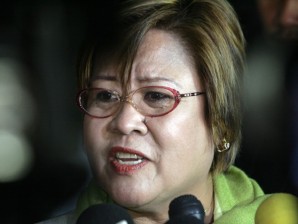MANILA, Philippines—Two Senate committees will ask Justice Secretary Leila de Lima to explain why she issued a new order that allows the release of drug suspects while their cases are under review.
“The prevailing rule is that suspects shall remain in police custody but in a new department circular, this has been revised so that suspects may now be released pending a review of their cases by the justice secretary,” Senate Majority Leader Vicente Sotto III said in a privilege speech on Monday.
Sotto, chair of the Dangerous Drugs Board during the Arroyo administration, warned that drug dealers could easily use De Lima’s new policy to escape prosecution.
De Lima issued Department Circular No. 012 on February 13, putting drug cases, whether under inquest, preliminary investigation or appeal and that carry the penalty of life in prison, under automatic review by the Office of the Secretary of Justice.
The order requires the submission of the records of the cases to the secretary’s office within three days of resolution.
The review must be completed within 30 days, and the suspects may be released from detention unless they were being held on other charges.
Prior to the relaxation of the rules, drug suspects could be released only after the dismissal of their cases or after affirmation on review that they were not guilty.
“This change in policy is a big blow to the campaign against drug violators and traffickers,” Sotto said. “[The] circular makes our antidrug campaign harder because once a suspect is released, the authorities would not be able to find him anymore.”
He asked the Senate committees on justice chaired by Sen. Francis Escudero and public order headed by Sen. Gregorio Honasan to invite De Lima to explain the circular.
De Lima said in February that the new order underscored the justice department’s commitment to improve the administration of justice by providing “a just, speedy and effective means to resolve drug cases” while respecting human rights.
